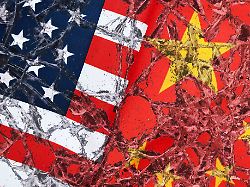In the trade conflict with the United States, Beijing has a supposed ace up its sleeve with export restrictions. Even if the effects of raw material controls on gallium and germanium miss their target, according to China expert Löchel, they represent a new level of escalation.
An eye for an eye, a tooth for a tooth? The response from Beijing to US export restrictions on semiconductors from China was not long in coming: from August 1, companies exporting gallium and germanium products must apply for a license.
The Ministry of Commerce affirms that the measures are “not targeting any country”. However, experts see the announcement as a retaliatory measure. “Reprisal is a strong word. But of course: China is reacting to the restrictions imposed by the USA with export controls and sending the message: We can do what you can for a long time,” says Horst Löchel, who is the Sino-German Center at the Frankfurt School of Finance & Management, ntv.de.
In the technology dispute, China pulls the next trump card with export restrictions on gallium and germanium. The People’s Republic is the main producer of the important raw materials. Both elements are so-called semiconductors – which makes them particularly attractive for the chip industry. They are used in high-performance computers, in the defense industry and in solar systems.
The effects of the commodity controls announced by China are still difficult to assess. “Although gallium and germanium are both important commodities, even an outright ban, which is very unlikely, would have a much smaller effect than American restrictions on high-end chips,” says Antonia Hmaidi, analyst at the Mercator Institute for China Studies, ntv.de. There are non-Chinese alternatives to the two raw materials or the possibility of recycling. “With enough incentives, supply chains could also form outside of China,” says Hmaidi. Loechel also agrees: “The restrictions on chip exports are significantly more serious for China than the restrictions on the export of gallium and germanium for the USA.”
“We are in danger of heading towards an economic war”
When issuing licenses, the Ministry of Commerce ensures that the exports comply with the applicable regulations. Among other things, this involves information on the destination of the exports and the planned use of the raw materials. Hmaidi classifies the mandatory licenses as relatively mild. “A de facto ban would be a much higher escalation level,” she says ntv.de. However, the fact that the licenses are already mandatory from August could lead to problems in the short term. “However, China’s government has little reason not to grant these licenses to at least most Chinese exporters,” she says.
Löchel sees it more critically. For him, however, the measure represents a new level of escalation. “We run the risk of heading towards an economic war – to the detriment of all of us,” says the China expert. Any further measure not only harms the economy, but also companies and consumers. “It’s a classic lose-lose situation for everyone involved.”
And indeed, the announcement is already making waves: According to a manager of a Chinese germanium producer, several customers from Japan, Europe and the USA have already contacted him. They wanted to bunker as many raw materials as possible by the deadline. The reason: You expect the processing time for the export applications to take up to two months.
The increased demand has recently driven up germanium prices by almost ten percent to the equivalent of $1,380 per kilogram. The shares of some Chinese mining companies such as Yunnan Lincang Xinyuan or Yunnan Chihong also gained up to ten percent.
Since China has so far only controlled and not restricted the exports of the two raw materials, the effects on German customers are not yet foreseeable. Economics Minister Robert Habeck is nevertheless already concerned: the People’s Republic has now begun to get serious about two metals, the Greens politician said this week. If export controls were extended, for example to lithium, Germany would have a completely different problem. According to Löchel, China will probably not shy away from restricting lithium exports. In his view, whether the situation will escalate further depends not only on China, but also on how the West behaves. “I don’t think China will proactively sanction lithium and rare earths.”
Alternative suppliers are available
Companies around the world are already looking for alternative sources of supply for important materials in order to reduce their dependency. According to Löchel, the so-called elasticity of substitution is fortunately very high for gallium and germanium. This means that these two raw materials are also relatively easy to obtain and produce in other countries.
The Democratic Republic of the Congo has already offered itself as an alternative supplier of germanium. We will produce germanium to replace material that is not available on the market,” said Guy Robert Lukama, head of the state-owned mining company Gecamines. His company had already secured financing for a new plant to extract raw materials for the semiconductors in the spring -Manufacture secured.
The relationship between the world’s two largest economies has recently deteriorated drastically. “Economy and finance are used as weapons. I’ve never experienced the kind of politicization of the economy we’re seeing right now,” says Loechel. During her visit to Beijing, US Treasury Secretary Janet Yellen is currently trying to limit the damage and improve relations between the two great powers. The US sought healthy economic competition. “A decoupling of the world’s two largest economies would be destabilizing for the global economy,” she said. “And it would be practically impossible.”
